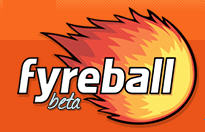 Forwarding YouTube videos and other cool links to friends has become an email tradition. But a number of companies make it easier to share media with a large group of people. The latest is Fyreball, which bills itself as a “cool way to send things to your friends.”
Forwarding YouTube videos and other cool links to friends has become an email tradition. But a number of companies make it easier to share media with a large group of people. The latest is Fyreball, which bills itself as a “cool way to send things to your friends.”
You can log into Fyreball and build a “page” which you can forward. You drag and drop links for videos, pictures, music, or text. But beyond that, you can forward simple Flash games, make and track comments, and see how many people you can reach with the page as a result of people forwarding it to their friends.
This is the brainchild of Pete Parsons, Fyreball’s CEO, who I knew in his previous life. He was a longtime Microsoft manager who oversaw the game development powerhouse Bungie as it launched the “Halo” and “Halo 2” games for Microsoft’s Xbox video game console. But now he is a little less hardcore than he used to be as a social networking guy.
Getting people to move past the familiarity of email is Fyreball’s biggest challenge, but it also has competitors such as Pownce. I’ve played around with Fyreball. It formalizes the way you share things with friends. In fact, it’s easier than attaching things to emails and sharing them with friends by typing in their email addresses on a cc header.
 “We think of Fyreball as a fun alternative to email,” Parsons said. “The community that builds around it is just like a global pass-along game.”
“We think of Fyreball as a fun alternative to email,” Parsons said. “The community that builds around it is just like a global pass-along game.”
You can throw all the related material onto a page, write captions, and then share that page with friends. You can’t track who your friends share it with for privacy reasons, but you can find out stats on how many people your Fyreball reaches.
It thus becomes a competition to see who can share a page that gets the most comments or spreads in the most viral fashion. Parsons sent me a bunch of cute Flash-based games that members have created, like “Screaming Beans,” where the object is to squash beans by clicking on them as they move about on the screen.
In another string, a “Halo 3” fan shared a screen shot that showed how he scored a “double kill” with a weapon called a Spartan Laser in the Xbox 360 game (Halo 3 allows you to upload films and photos of your game exploits to Bungie.net). Another fan in the string shared a different screen shot of his own kill using a Spartan Laser.
 Parsons had been working on the Xbox 360 video games that Peter Jackson’s new game studio was supposed to make for Microsoft. (Nothing has happened there yet, nor with the “Halo” movie that Jackson was supposed to direct). But he left to start Fyreball, which he viewed as a “global game of pass it on.”
Parsons had been working on the Xbox 360 video games that Peter Jackson’s new game studio was supposed to make for Microsoft. (Nothing has happened there yet, nor with the “Halo” movie that Jackson was supposed to direct). But he left to start Fyreball, which he viewed as a “global game of pass it on.”
He received advice on Fyreball from Jordan Weisman and Ed Fries, two former Microsoft Games veterans who have also moved on to better things. Weisman, who created innovative viral games such as Microsoft’s “ilovebees.com” campaign to market Halo 2, lent his own ideas on how to craft Fyreball. Weisman served as a chief creative officer at Fyreball for a time to get it off the ground and then he became an advisor.
Fyreball got about $1 million in funding from the Silicon Valley Band of Angels as well as the Alliance of Angels in Seattle (see our coverage). The company has nine employees. The company is now starting its open beta test and turning on a Facebook application.
Parsons says there are a couple of ways to make money. One possibility is just like Amazon.com’s affiliate program, where the e-commerce site pays those who refer business to it. Since the best Fyreballs are viral, they are a great engine for spreading content. Parsons calls it a “content referral engine that generates affiliate sales.”
The Fyreball platform can be embedded as a widget in other web sites. Those sites can “skin” the platform to look the way the customer wants. A small section is reserved for advertising, which is another source of revenue for Fyreball.
People can form groups, which Parsons calls clans, so they can share rich content with just their friends or families. They can also share a rich-content page with everyone publicly just by clicking a single button.
VentureBeat's mission is to be a digital town square for technical decision-makers to gain knowledge about transformative enterprise technology and transact. Learn More
